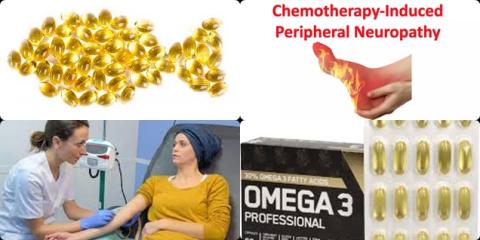
Objectives:
Omega-3 polyunsaturated fatty acid (PUFA) supplementation has been proposed as a potential therapy for cancer-related malnutrition, which affects up to 70% of patients with cancer. Therefore, this review article has been conducted.
Do patients with cancer benefit from oral omega-3 PUFA supplements?
Study design:
This review article included 31 RCTs.
Trials supplementing ≥600 mg/d omega-3 PUFA (oral capsules, pure fish oil or oral nutritional supplements) compared with a control intervention for ≥3 weeks.
The Cochrane risk of bias tool graded most trials as “unclear” or “high” risk of bias.
Results and conclusions:
The investigators found meta-analyses showed no significant difference between omega-3 PUFA supplements and control intervention on muscle mass, quality of life and body weight.
The investigators found oral omega-3 PUFA supplements significantly reduced the likelihood of developing chemotherapy-induced peripheral neuropathy with 80% [OR = 0.20, 95% CI = 0.10 to 0.40, p 0.001, I2 = 0%].
The investigators concluded that oral omega-3 PUFA supplementation may reduce the incidence of chemotherapy-induced peripheral neuropathy in patients with cancer. May reduce because most trials were graded as “unclear” or “high” risk of bias.
Original title:
The effect of oral omega-3 polyunsaturated fatty acid supplementation on muscle maintenance and quality of life in patients with cancer: A systematic review and meta-analysis by Lam CN, Watt AE, [...], van der Meij BS.
Link:
https://pubmed.ncbi.nlm.nih.gov/34130028/
Additional information of El Mondo:
Find more information/studies on omega- 3 fatty acids and cancer right here.
Chemotherapy-induced peripheral neuropathy (CIPN) is one of the most frequent side effects caused by antineoplastic agents. Antineoplastic drugs are medications used to treat cancer. Antineoplastic drugs are also called anticancer, chemotherapy, chemo, cytotoxic or hazardous drugs.